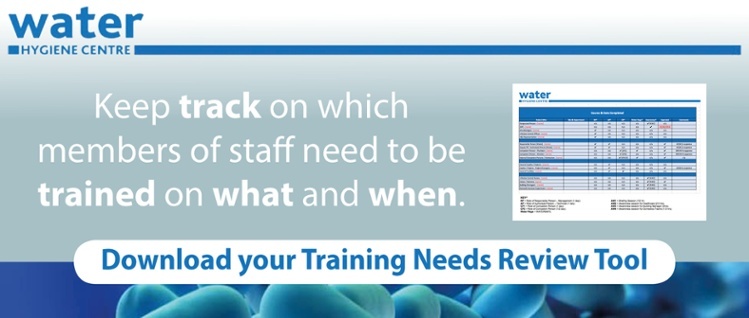Many Estates and Facilities staff may well say the basics of Legionella training don’t fundamentally change over time – indeed what worked 30 years ago, works just as well today, especially if we follow the old adage of ‘keep it moving, keep it clean, keep it at the correct temperature’ – nor have we had a case of Legionnaires’ Disease (yet!).
There is some degree of truth in that, though we keep our fingers crossed regarding the latter. It’s not too contentious to state that many organisations, including public sector/services organisations, are resistant to fundamental changes in strategic and operational procedures – and Legionella training is often a trigger to remind us that the way we’ve approached things historically, may not necessarily still be the best way to ensure adequate risk minimisation.
Legionella - Guidance and Regulation
Of course, the blunt answer to the question of why we should refresh any Health and Safety training, including Legionella or similar water hygiene training is because The Management of Health and Safety at Work Regulations (MHSWR) (1999) says we must do so.
It requires employers to put in place arrangements to control health and safety risks – to meet any legal requirements and specifically, this should include “instruction and training for employees in how to deal with the risks”. These regulations use broad brush stokes regarding training and essentially only state it must be:
- Repeated periodically where appropriate;
- Adapted to take account of any new or changed risks to the health and safety of the employees concerned.
 Confirmed Legionnaires’ disease cases remain relatively rare in the UK, accepting the point that many cases go unnoticed, but the lack of a case or prosecution is no reflection on the success of a water hygiene management system. Indeed, many HSE improvement notices have been issued over the years regarding training issues – such as the National Museum of Scotland in 2012 requiring them to ensure that key staff were appropriately trained in the safe management of water systems.
Confirmed Legionnaires’ disease cases remain relatively rare in the UK, accepting the point that many cases go unnoticed, but the lack of a case or prosecution is no reflection on the success of a water hygiene management system. Indeed, many HSE improvement notices have been issued over the years regarding training issues – such as the National Museum of Scotland in 2012 requiring them to ensure that key staff were appropriately trained in the safe management of water systems.
The HSE’s ACOP L8 (4th edition) backs this up by stating:
“Inadequate management, lack of training, and poor communication are all contributory factors in outbreaks of legionnaires’ disease”.
and goes on to say specifically, that staff:
“must be properly trained to a level that ensures tasks are carried out in a safe, technically competent manner; and receive regular refresher training”.
Legionella Training - The Purpose
We should remember the main purpose of any training including that relating to Legionella bacteria, is to produce a positive change (not least a safer working environment) in the functioning of an organisation. At an individual level, updated training ensures a person’s knowledge or skills are improved, and it remains a key part of developing competent staff at ‘all’ levels. The world of compliance demands that organisations measure how well they conform to documented regulations, standards, and guidance.
The world of compliance demands that organisations measure how well they conform to documented regulations, standards, and guidance.
Without updated training though, how do we know if we are sufficiently compliant or not?
What has changed since our previous training sessions?
Are there technical innovations that could benefit the organisation, or are there more nuanced approaches we could adopt?
We could also consider whether a lack of training is currently hampering the success of the organisation. – it may well be a contributory factor.
Why refresh your Legionella training now?
BSI issued BS8680 Water Quality – Water Safety Plan – Code of Practice during 2020 – a key guidance document relevant to all organisations. The development of a Water Safety Plan (WSP) is a significant undertaking and training at this point would be key to aiding its development during 2024.
We also need to ask ourselves, since the issue of HSG 274 parts 1-3 in 2014 whether we undertake all of its requirements. And if not, would training now be a useful reminder of the items lacking from our Legionella risk management system?
Neither Regulations nor current guidance indicate specific time frames for refresher training and depending on the role of an individual this will vary – refreshers are commonly every 2 or 3 years. Operational training perhaps may be more frequent than for those staff in strategic roles.
So Legionella/water hygiene refresher training is a necessity, the relatively minor costs and time to attend a course are comfortably offset by many benefits to existing staff, helping to avoid complacencies that may have set in, helping resolve long-standing issues or concerns, allowing an open discussion with fewer internal political concerns, learning from colleagues or outsiders, improving motivations and efficiencies, maybe even helping us learn a few new tricks, but mainly to create a safer working environment for all.
Do you want to learn more about legionella training? Read our full "Legionella training courses guide" >
Feel free to reach out if you have any questions about this blog or if you would like to consult with one of our experts for further advice on water hygiene.
Editors Note: The information provided in this blog is correct at the date of original publication - February 2021 (Revised February 2024).
© Water Hygiene Centre 2024









